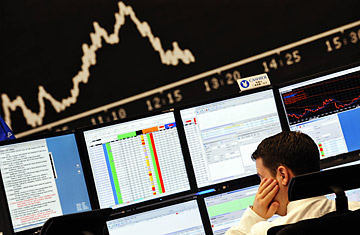
Integrity might sound like a personal virtue, but a new book says it's actually a precious economic asset. In The Economics of Integrity, journalist Anna Bernasek writes that almost every aspect of the modern global economy — from getting cash at an ATM to trading gold in international markets — is possible only because of deep-seated trust. She talked to TIME about the financial crisis, what's wrong with the dictionary definition of integrity, and how trust creates wealth.
Where did this idea come from?
It grew out of the financial crisis, and seeing what happens to the economy when you have a crisis of integrity. A small group of people doing the wrong thing can really create problems for everybody. I was thinking, well, gee, then what happens if you actually create more integrity?
You write that integrity is widely misunderstood. What don't people get?
I don't think they understand that if you act with integrity you actually can create wealth. We tend to think in a conventional way of integrity as — if you look it up in the dictionary — honor, honesty, moral rectitude. We think of it as a personal issue, a private morality, entirely up to you. But this way of thinking about integrity, the economic view, is a collective view. It's all about us. It underpins everything we do in the economy. [For] any transaction [to] succeed — whether you're buying or selling or borrowing or lending — you need to have this relationship of integrity and trust. And once you have that relationship you basically have an asset that produces economic value.
In the book you use milk as an example.
When you walk into a corner store and you buy a gallon of milk, you hand your money over to the storekeeper and you walk away. You're trusting in the integrity of the storekeeper to deliver milk [that] is safe and good. So that's just a basic trust in integrity. But if you start peeling back the layers off that transaction you can see there are far more relationships of integrity and trust needed to bring that milk to you. You can start with the farmer who needs to look after his cows properly, the vet who gives the cattle their antibiotics, all the way up the milk chain of the lab technicians, the plant workers, the distribution company. Not only are you trusting in their integrity, but they're all trusting each other. Because they all depend on each other to produce a gallon of milk that you as the customer are going to buy.
You suggest that we wrongly believe that doing the right thing will prevent us from getting ahead. Where do you think that idea comes from?
I think it comes from a short-term mentality. We've moved away from the long-term mentality of creating wealth to a slightly more short-term need for making money. There can be often a conflict between what I need to make money today and acting with integrity. Not really thinking, 'Gee, do I want to be here in 10, 20, 30 years' time?' can lead people to compromise on their integrity in pursuit of making money now.
You talk about creating integrity systems. What are those?
I use eBay as an example of how you can create integrity from scratch. If you played according to the rules — if you bought, if you sold exactly the products in the way that you said they were, if you handed them over to the buyer in good order — then everybody created wealth and everybody benefited. And that cycle of integrity and wealth encouraged more people to come in. And then you had a bigger pot of integrity and a bigger pot of creating wealth. It's a virtuous circle.
What are the key components of creating an integrity system?
I call it the DNA of integrity: Disclosure, Norms and Accountability. [By] disclosure I mean bringing the truth out into the open so people can make their own decisions. Norms [are] basic guidelines that are simple, easy to understand and intuitive. If you're buying [on eBay], the rule is, you follow through and you send your money. If you're selling, you basically send your goods in the way that you say you will. That makes sense to us; it's easy to follow those rules. Lastly, accountability. This isn't about trying to catch people. It's actually about giving people the perception that if they break the rules there's a good chance they'll get caught.
I think there are two other factors I would include. One is a long-term view. [With] eBay, the potential for cheating was just enormous. What they did with their feedback system — where today buyers can rate sellers on how they behave — is that suddenly they brought sellers' behavior out into the open. So if you want to do business with a seller you can look at their feedback scores and decide, do I trust this person or not. So all of a sudden, it changed the dynamic: it eliminated the possibility of short-term cheating. If you cheated one person, it would go on your record. And then suddenly nobody would want to do business with you. That long-term view is really critical. And then the last thing is the feedback. When we put in place rules from government, new laws, regulations, you just have no idea how it's really going work out. So you need a feedback system that actually allows you to judge, to monitor, to make changes, to be adaptable.
